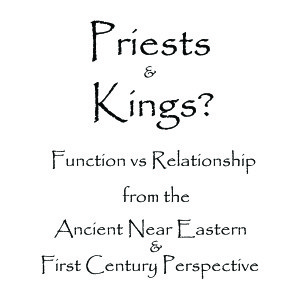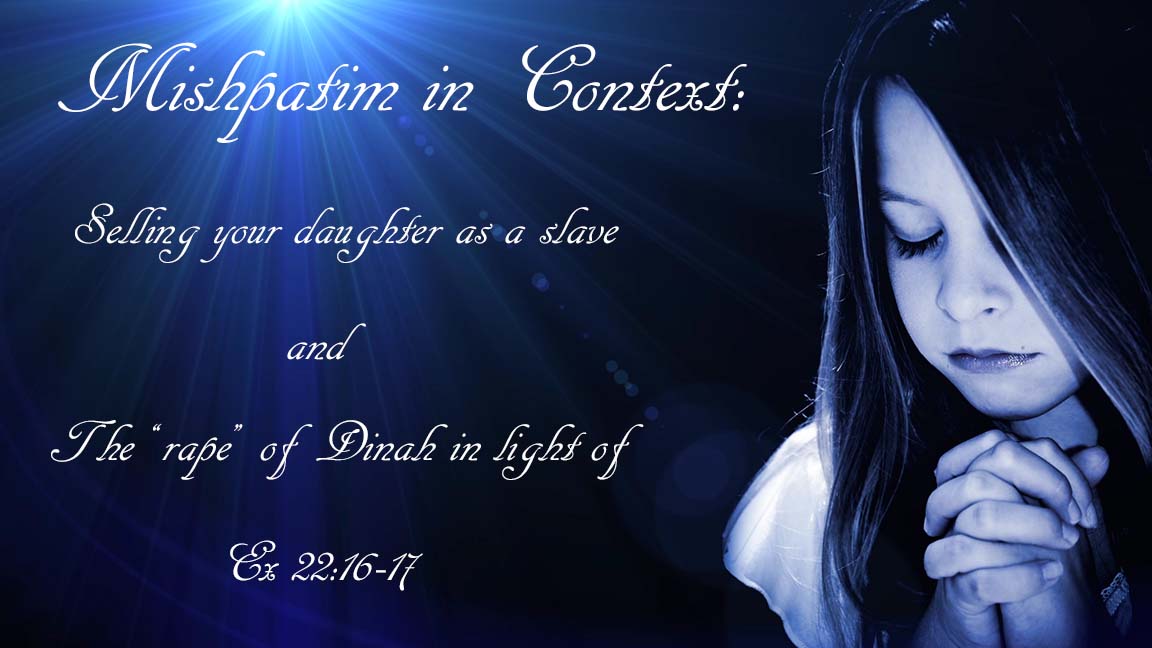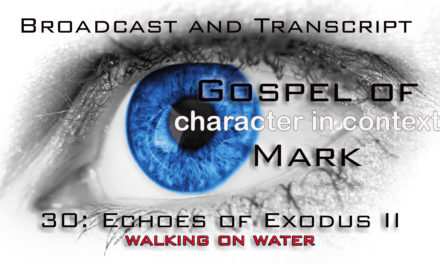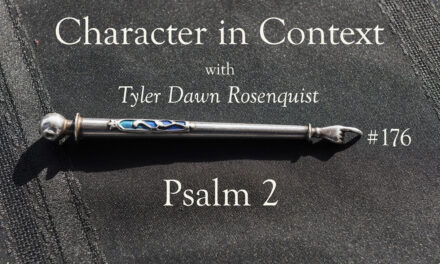 Ex 19:6a “And ye shall be unto me a kingdom of priests, and an holy nation.”
Ex 19:6a “And ye shall be unto me a kingdom of priests, and an holy nation.”
Rev 1:6 “And hath made us kings and priests unto God and his Father; to him be glory and dominion for ever and ever. Amen.”
Rev 5:10 “And hast made us unto our God kings and priests: and we shall reign on the earth”
If you didn’t get the chance to catch my teaching on this subject on the Wednesday night WIT Talmidim a few weeks back, I encourage you to do so because I laid out a half hour worth of context that I am about to skim over.
What did it mean to be a Priest or a King in the Ancient Near East, in terms of one’s relationship with their god? Well, first of all, the common people had no relationship with the chief deities whatsoever. Whereas they took care of their ancestral teraphim (believed to represent their ancestors, and needed to be fed and cared for), the pantry gods (snakes), and the hearth and threshold gods, the worship of the city gods was the duty only of the chief priests and Kings. This was a professional duty, to care for Ba’al and Ashtoreth and other major deities, so that the universe would run smoothly. The “big gods” had a lot of work to do – causing the sun to shine and the rain to fall and the crops to grow – and so it was the duty of the ruling class to make sure that their physical needs were taken care of. They were dressed in the morning, fed throughout the day and put to bed at night. Now, no one thought that these idols were actually the gods but instead a physical receptacle for the essence of the god. Feeding the idol, therefore, was feeding the essence of the god. A contented god does his or her job and the universe maintains its order, a hungry god gets distracted and cranky and bad things start happening.
To keep this from happening, the priests and kings had very intricate ceremonies that they had to perform. If they did anything wrong, anything at all, the fate of the country would hang in the balance – famine, pestilence, defeat in war, barreness, terrible things. So the common people could not be trusted to pray, and make petitions, and worship – in fact, they didn’t want the common people anywhere near the big gods.
In Ancient Israel however, we see YHVH set up a radical counter-cultural precedent. He didn’t want only the Priests and the Kings to have a relationship with Him, He desired an entire holy Nation that would afford each person individual access. This was not a conferring of position, but a revelation of the type of relationship with the Chief Deity that had always been reserved for priests and kings.
Sadly, I have heard those who call into question the first priesthood as having been replaced. Is this possible, based on Covenant Law? Now, before the golden calf incident, the first-born of the family was intended to be designated priest, but because of the actions of the Levites, the priesthood was given forever to the sons of Aaron as a Royal Grant Covenant, sworn by oath in the Name of YHVH. Note that nowhere in scripture is the priesthood given by Covenant to the firstborn, but it was given by Covenant to the sons of Aaron forever, and the tithes to the Levites. When there is a Temple, it is their privilege and obligation to serve.
Num 18:19-24
All the heave offerings of the holy things, which the children of Israel offer unto the Lord, have I given thee, and thy sons and thy daughters with thee, by a statute for ever: it is a covenant of salt for ever before the Lord unto thee and to thy seed with thee.
And the Lord spake unto Aaron, Thou shalt have no inheritance in their land, neither shalt thou have any part among them: I am thy part and thine inheritance among the children of Israel.
And, behold, I have given the children of Levi all the tenth in Israel for an inheritance, for their service which they serve, even the service of the tabernacle of the congregation.
Neither must the children of Israel henceforth come nigh the tabernacle of the congregation, lest they bear sin, and die.
But the Levites shall do the service of the tabernacle of the congregation, and they shall bear their iniquity: it shall be a statute for ever throughout your generations, that among the children of Israel they have no inheritance.
But the tithes of the children of Israel, which they offer as an heave offering unto the Lord, I have given to the Levites to inherit: therefore I have said unto them, Among the children of Israel they shall have no inheritance.
So we see that there are actual priests, and will be forever, whose job would be the ministry within the Tabernacle/Temple. That actual earthly priesthood cannot be given to anyone else or God has broken his own Covenant, which would bring dishonor to His Name. The Temple duties belong to the sons of Aaron. The tithe belongs to the Levites. We can’t touch either of those without calling God’s integrity into question.
Some might say, “Well what about the Melchizedek Priesthood?”
Well, the Name of Melkizedek is only mentioned three times in scripture – the first being in reference to the actual Melchizedek who Abraham encounters, the second in Psalm 110 and the third in the book of Hebrews, quoting Psalm 110.
Psalm 110:4 The Lord hath sworn, and will not repent, Thou art a priest for ever after the order of Melchizedek.
And so we have a promise made to one person in the Psalm that they and they alone are a priest forever according to the order, not of Aaron, but of Melchizedek. But we see that only the sons of Aaron may serve as the earthly priesthood, by God’s sworn word. So where is the only remaining place that the Melchizedek priest can serve? As the author of Hebrews states – in the Heavenly Temple. There are human priests who are authorized to serve in the earthly Temple.
Heb 8:3-5 For every high priest is ordained to offer gifts and sacrifices: wherefore it is of necessity that this man have somewhat also to offer. (this is not past tense, but present tense)
For if he were on earth, he should not be a priest, seeing that there are priests that offer gifts according to the law: (Who cannot be a priest on earth? Yeshua, He is from the wrong tribe and again, we see that there are, present tense, legal priests)
Who serve unto the example and shadow of heavenly things, as Moses was admonished of God when he was about to make the tabernacle: for, See, saith he, that thou make all things according to the pattern shewed to thee in the mount. (Present tense, again, the priests serve the purpose of priests – showing us the difference between the holy and the profane, as well as the clean and unclean)
Now, a grant covenant is made to a man and his descendants for good and faithful service, and so Yeshua and His children would be eligible for this “Melchizedek” priesthood. But Yeshua has no children, at all. When we accept His blood we become adopted by the Father, not Yeshua, so we are all of us neither eligible to be actual priests in the Heavenlies nor here on earth. It would be illegal. We are not descendants of the Melchizedek priest but children of the Living God – whom the eternal Heavenly priest serves.
Neither are we actual literal Kings because the Kingship was given by Covenant only to David and his descendants through Solomon.
No, those who make us literal priests and literal kings must do so outside of the context that those to whom the Bible was directly written would have understood. They knew that the big deities were only in relationship with the priests and kings – from the time of Abraham up to and beyond the time of Yeshua, from the pantheon of the Ancient Near East to the Imperial Cult of Rome. The big gods were for the big people, not the common people. The God of Abraham, Isaac and Jacob changed all that.
He gave a holy Nation access to Himself. He did not give them all the same function, but He did give them all the same rights to pray, petition and worship. He made a Nation with priestly access and kingly access to Himself. It was nothing short of revolutionary.
If you want to study for yourself, here are two very excellent books, one by John Walton and the other by Everett Ferguson.





















Wow, this is a really excellent post and sheds light on the context of the verses mentioned. Thank you very much for this Tyler.